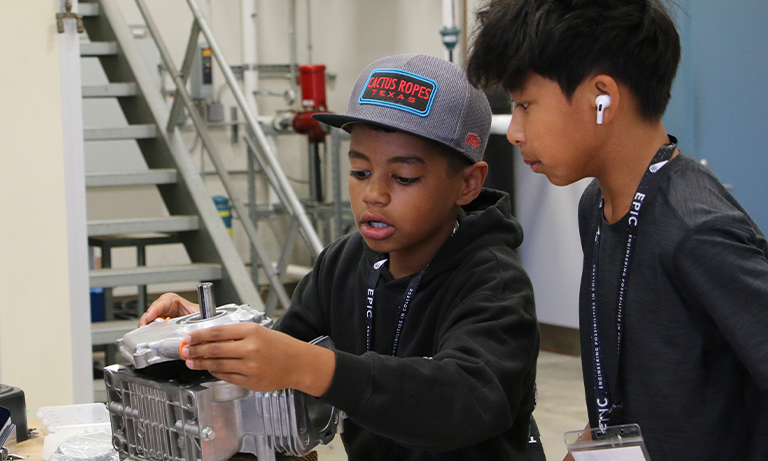Congratulations to the College of Engineering’s 2020 Summer Undergraduate Research Program Notable Projects! The 2020 program culminated in the online SURP Symposium in early October. A three-judge panel heard presentations from five groups of projects — Aerospace, Biomedical/Pedagogy, Computing and Cyber, Electrical, and Mechanical/Materials/Industrial/Civil — and selected two from each group for recognition. The 10 notable projects include:
Aerospace
Parametric Turbofan Propulsion Model —Aerospace engineering students JP O’Dell and Joseph Hammond worked on a project to develop a tool for modeling turbofan performance based on manufacturer’s data for aircraft conceptual designers. The project was mentored by aerospace engineering professor Paulo Iscold and sponsored by Lockheed Martin.
Concept Development of a Nano-Reaction Control System for Small Satellites — Working with aerospace professor Pauline Faure, electrical engineering student Danny Maas and software engineering student Walden Hillegass developed a proof of concept test for the avionics that will control the valves and heaters of a propulsion system for CubeSats.
Biomedical/Pedagogy
The CAR (Confront, Address, Replace) Strategy — Electrical engineering senior Amman Asfaw and civil engineering sophomore Storm Randolph researched the CAR (confront, address, replace) Strategy as a new pedagogy aiming to drive out iniquitous terminologies (e.g., “master-slave”) in STEM. The project was advised by electrical engineering professor Andrew Danowitz and ethnic studies and women’s, gender and queer studies professor Jane Lehr.
Study of Locomotion of a Hopping Robot — Mentored by mechanical engineering professor Siyuan Xing, senior mechanical engineering students Matthew Frost and Bradly Kwan analyzed stability criterion and motion dynamics of different gaits on a one-legged hopping robot.
Computing and Cyber
Fleet Management via RFID — Software engineering students Keegan Divine and Computer Science students Harumi Hokari worked on developing a new system model for a fleet management system which incorporated a RFID reader to Boeing licensed trucks. The project was advised by computer science professor Dongfeng Fang and sponsored by Boeing.
Shark Spotting with Drones — In a project sponsored by Nic and Sara Johnson, computer science students Kathirvel Gounder and Grace Nolan created an improved learning model for the neural networks on drones for real time shark spotting. Computer science professor Franz Kurfess was the adviser on the project, which worked with aerial footage from the Shark Lab at Cal State Long Beach.
Electrical
Photovoltaic Array Soiling Reduction through Optimization of Stowing Angle — Mechanical engineering student Shayla Schoensee studied how adjusting the nighttime tilt angle of single axis trackers of photovoltaic panels at solar farms can minimize power loss from dust and soiling. The project was mentored by Dale Dolan and sponsored by CP Connect.
Resilient Critical Infrastructures — Computer engineering students Austin Grassbaugh and Annie Joss worked with faculty advisor Joseph Callenes-Sloan on a project that focused on resiliency and security in power systems of the future that will have increased distribution systems in contrast to centralized power plants. The project was sponsored by Northrop Grumman.
Mechanical/Materials/Industrial/Civil
Drone Applications in Construction — Civil engineering students Robert Sprotte and Andrea Leal Ruiz worked with professor Hani Alzraiee on a project that creates a machine learning framework for using drones to capture data for an automated pavement marking defect identifier tool.
Evaluation of Cost-effective Pavement Deformation Detection Technologies using Mobile LiDAR — Scanning roads for pavement defects is also the subject of a CP Connect-sponsored project by civil engineering student William Andrews and advised by Anurag Pande and Alireza Shams. The project looks at mobile LiDAR equipment attached to a vehicle that scans the road surface, saving time and labor, and does not requires roads to be closed.
Download the complete list below:


